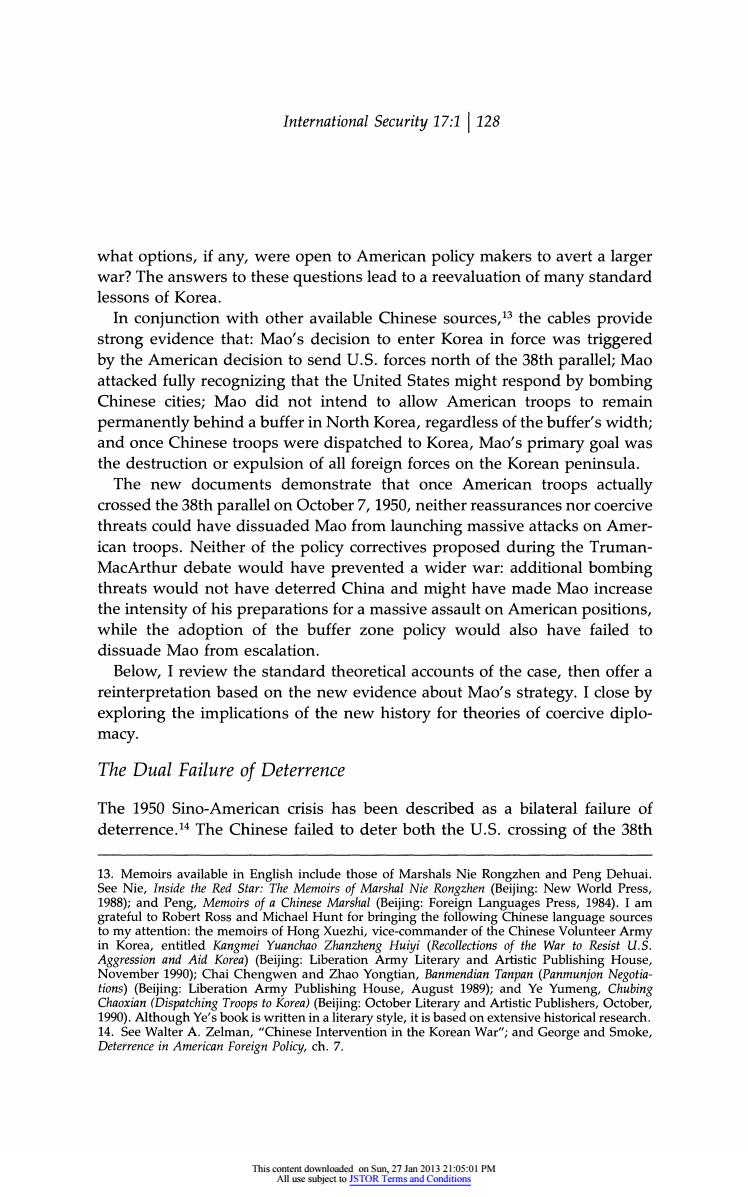正在加载图片...

International Security 17:1 128 what options,if any,were open to American policy makers to avert a larger war?The answers to these questions lead to a reevaluation of many standard lessons of Korea. In conjunction with other available Chinese sources,13 the cables provide strong evidence that:Mao's decision to enter Korea in force was triggered by the American decision to send U.S.forces north of the 38th parallel;Mao attacked fully recognizing that the United States might respond by bombing Chinese cities;Mao did not intend to allow American troops to remain permanently behind a buffer in North Korea,regardless of the buffer's width; and once Chinese troops were dispatched to Korea,Mao's primary goal was the destruction or expulsion of all foreign forces on the Korean peninsula. The new documents demonstrate that once American troops actually crossed the 38th parallel on October 7,1950,neither reassurances nor coercive threats could have dissuaded Mao from launching massive attacks on Amer- ican troops.Neither of the policy correctives proposed during the Truman- MacArthur debate would have prevented a wider war:additional bombing threats would not have deterred China and might have made Mao increase the intensity of his preparations for a massive assault on American positions, while the adoption of the buffer zone policy would also have failed to dissuade Mao from escalation. Below,I review the standard theoretical accounts of the case,then offer a reinterpretation based on the new evidence about Mao's strategy.I close by exploring the implications of the new history for theories of coercive diplo- macy. The Dual Failure of Deterrence The 1950 Sino-American crisis has been described as a bilateral failure of deterrence.14 The Chinese failed to deter both the U.S.crossing of the 38th 13.Memoirs available in English include those of Marshals Nie Rongzhen and Peng Dehuai. See Nie,Inside the Red Star:The Memoirs of Marshal Nie Rongzhen (Beijing:New World Press, 1988);and Peng,Memoirs of a Chinese Marshal (Beijing:Foreign Languages Press,1984).I am grateful to Robert Ross and Michael Hunt for bringing the following Chinese language sources to my attention:the memoirs of Hong Xuezhi,vice-commander of the Chinese Volunteer Army in Korea,entitled Kangmei Yuanchao Zhanzheng Huiyi (Recollections of the War to Resist U.S. Aggression and Aid Korea)(Beijing:Liberation Army Literary and Artistic Publishing House, November 1990):Chai Chengwen and Zhao Yongtian,Banmendian Tanpan (Panmunjon Negotia- tions)(Beijing:Liberation Army Publishing House,August 1989);and Ye Yumeng,Chubing Chaoxian(Dispatching Troops to Korea)(Beijing:October Literary and Artistic Publishers,October, 1990).Although Ye's book is written in a literary style,it is based on extensive historical research. 14.See Walter A.Zelman,"Chinese Intervention in the Korean War";and George and Smoke, Deterrence in American Foreign Policy,ch.7. This content downloaded on Sun,27 Jan 2013 21:05:01 PM All use subject to JSTOR Terms and ConditionsInternational Security 17:1 1 128 what options, if any, were open to American policy makers to avert a larger war? The answers to these questions lead to a reevaluation of many standard lessons of Korea. In conjunction with other available Chinese sources,13 the cables provide strong evidence that: Mao's decision to enter Korea in force was triggered by the American decision to send U.S. forces north of the 38th parallel; Mao attacked fully recognizing that the United States might respond by bombing Chinese cities; Mao did not intend to allow American troops to remain permanently behind a buffer in North Korea, regardless of the buffer's width; and once Chinese troops were dispatched to Korea, Mao's primary goal was the destruction or expulsion of all foreign forces on the Korean peninsula. The new documents demonstrate that once American troops actually crossed the 38th parallel on October 7, 1950, neither reassurances nor coercive threats could have dissuaded Mao from launching massive attacks on American troops. Neither of the policy correctives proposed during the TrumanMacArthur debate would have prevented a wider war: additional bombing threats would not have deterred China and might have made Mao increase the intensity of his preparations for a massive assault on American positions, while the adoption of the buffer zone policy would also have failed to dissuade Mao from escalation. Below, I review the standard theoretical accounts of the case, then offer a reinterpretation based on the new evidence about Mao's strategy. I close by exploring the implications of the new history for theories of coercive diplomacy. The Dual Failure of Deterrence The 1950 Sino-American crisis has been described as a bilateral failure of deterrence.14 The Chinese failed to deter both the U.S. crossing of the 38th 13. Memoirs available in English include those of Marshals Nie Rongzhen and Peng Dehuai. See Nie, Inside the Red Star: The Memoirs of Marshal Nie Rongzhen (Beijing: New World Press, 1988); and Peng, Memoirs of a Chinese Marshal (Beijing: Foreign Languages Press, 1984). I am grateful to Robert Ross and Michael Hunt for bringing the following Chinese language sources to my attention: the memoirs of Hong Xuezhi, vice-commander of the Chinese Volunteer Army in Korea, entitled Kangmei Yuanchao Zhanzheng Huiyi (Recollections of the War to Resist U.S. Aggression and Aid Korea) (Beijing: Liberation Army Literary and Artistic Publishing House, November 1990); Chai Chengwen and Zhao Yongtian, Banmendian Tanpan (Panmunjon Negotiations) (Beijing: Liberation Army Publishing House, August 1989); and Ye Yumeng, Chubing Chaoxian (Dispatching Troops to Korea) (Beijing: October Literary and Artistic Publishers, October, 1990). Although Ye's book is written in a literary style, it is based on extensive historical research. 14. See Walter A. Zelman, "Chinese Intervention in the Korean War"; and George and Smoke, Deterrence in American Foreign Policy, ch. 7. This content downloaded on Sun, 27 Jan 2013 21:05:01 PM All use subject to JSTOR Terms and Conditions